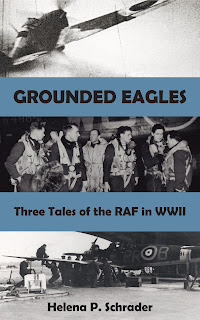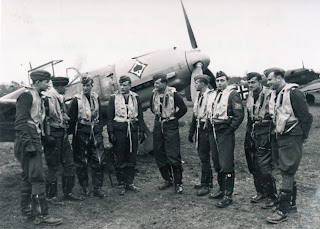During the Battle of Britain, squadron intelligence officers (commonly referred to as "the spy") played a critical role in collecting and collating information. They spoke to pilots immediately after landing to hear what they had seen and heard and they reviewed combat reports. Their analysis was critical to assessing the Luftwaffe's strength, tactics, and morale. Today I introduce Squadron Leader Allars -- The Spy of 606 Squadron
Excerpt:
It was quite late in the evening before Allars finally caught up with the CO in the Mess. By then, Allars was tired, annoyed and in pain. He had no patience for beating around the bush, and he got straight to the point. "I've looked into the combat reports from yesterday carefully, and I don't believe a word P/O Debsen told me. I don't believe he gave any warning -- at least, no one heard him. I don't believe he turned into the enemy -- or he would have encountered a little opposition and taken some damage to his aircraft. And I don't believe he chased and shot down an Me 110."
"What are you saying?" Jones asked, drawing his dark, bushy eyebrows together and narrowing his eyes.
"I'm saying that I think P/O Debsen not only falsified his combat report and made a false claim, but that he absented himself from the fight at the first sight of the enemy -- and before the bounce."
"But he fired his guns."
"He could have fired them into the sea. According to his erks, he fired less than a hundred rounds -- making it even more unlikely that he shot anything down."
Jones scowled, his thick eyebrows almost meeting over his nose. "I don't like what you're implying, Spy. Debsen's a gentleman, and I don't think it's fair to question a gentleman's word behind his back. Have you told him about your suspicions?"
"Not yet, but I will if you want me to."
"No, damn it!" Jones replied forcefully. "Leave the boy alone! He's young. We all make mistakes. I'm sure if he did something not quite above board, he regrets it now and won't do it again. He's a good lad, I tell you. Comes from a good stable."
"If that's the way you want to deal with it, sir," Allars replied tartly. His leg -- the one that wasn't there -- was killing him.
Squadron Leader Douglas Allars, the "Spy" for 606 Squadron, is a veteran of the First World War. He earned his wings in the Royal Flying Corps, where he flew as a fighter pilot in 48 Squadron under then Squadron Leader Keith Park. A crash left his leg hopelessly crushed and amputation had been necessary. He was invalided out of the service and took up a civilian career as an accountant.
As the Nazi threat grew, however, his old friend Keith Park (now an Air Vice Marshal) convinced him there was a place -- and more importantly a need -- for eagles with broken wings like him. He volunteered again and was trained in intelligence. His assignment is with 606 (Hurricane Squadron) stationed at Tangmere on the south coast of England.
Allars has a sharp analytical mind and he takes his job very seriously -- but without sentimentality. He's seen it all before. He knows the pilots are lambs for the slaughter. He keeps his distance from them. What he cares about is winning. And winning will be difficult.
Allars is acutely aware of what is at stake and he does not believe the RAF has margin for error. They have to be "top of their game" -- all of the time. Thus, despite being a man from a privileged background, Allars is anything but a snob. He has no tolerance for favoritism or excuses.
Allars will play a critical role in steering 606 Squadron out of potential disaster and molding it into an effective fighting unit -- but only from behind the scenes.
"This is the best book on the life of us fighter pilots in the Battle of Britain that I have ever seen.... I couldn't put it down."-- RAF Battle of Britain ace, Wing Commander Bob Doe.
Winner of a Hemingway Award for 20th Century Wartime
Fiction, a Maincrest Media Award for Military Fiction and Silver in the Global Book Awards.
Find out more at: https://crossseaspress.com/where-eagles-never-flew
they took the war to Hitler.
Their chances of survival were less than fifty percent.
Their average age was 21.
This is the story of just one bomber pilot, his crew and the woman he loved.
It is intended as a tribute to them all.
or Barnes and Noble.

For more information about all my books visit: https://www.helenapschrader.com








